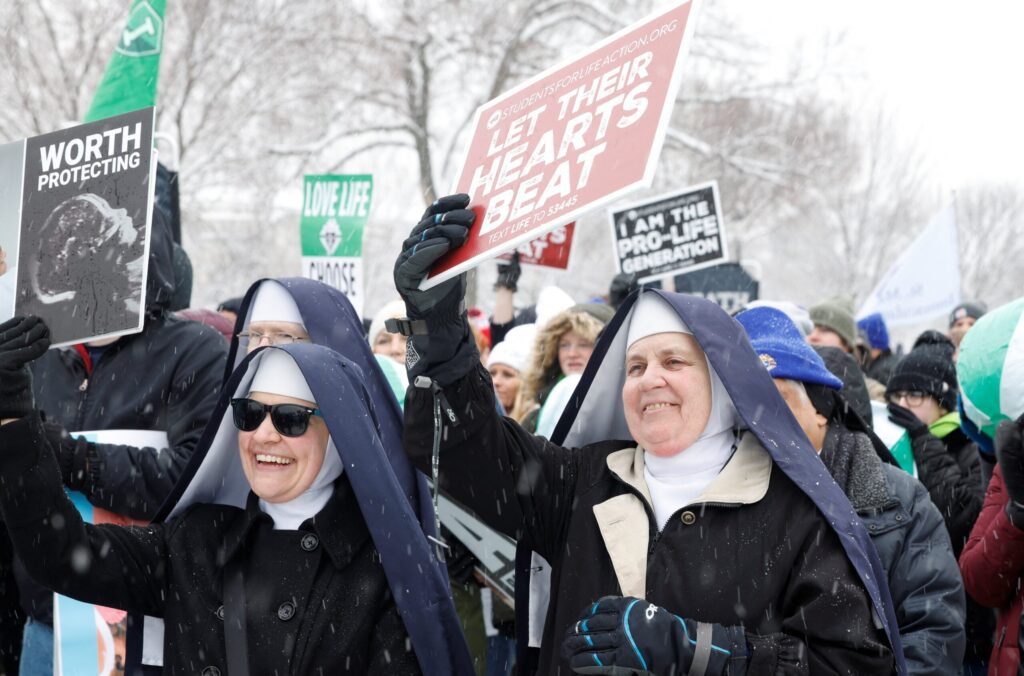
WASHINGTON (OSV NEWS) — Jennie Bradley Lichter, president-elect of the March for Life Education and Defense Fund, said challenges for the group’s cause on both political and cultural fronts also present an opportunity to demonstrate “leading with love.”
“I think we have a great opportunity ahead of us — as a pro-life movement and as an organization — to continue to refine our message and to continue to get better and better at speaking into this moment,” Lichter told OSV News in an interview.
Lichter, who will become president of both the March for Life organization and its sister lobbying organization in February, was previously deputy general counsel at The Catholic University of America in Washington, where she oversaw its Guadalupe Project, a campus-wide initiative to offer tangible support for pregnant and parenting students, faculty and staff.
That effort included increasing paid parental leave for faculty and staff from eight to 12 weeks, adding designated expectant-mother parking on campus; installing additional diaper-changing stations on campus, including in men’s restrooms; and making diapers and wipes available through the on-campus food pantry, as well as other new resources for pregnant students.
Asked how other institutions could make similar efforts, Lichter urged “responsiveness to a specific community’s concrete needs.”
“I think many institutions could stand to take a hard look at their paid parental leave policies and think about whether they have the capacity to make them just a little bit more generous,” she added.
Lichter will take the reigns of the key pro-life organization after a 2024 election cycle in which abortion was a key issue, and as a growing share of American adults identify as “pro-choice” just two and a half years after the U.S. Supreme Court overturned its 1973 Roe v. Wade decision that legalized abortion nationwide and initially prompted the annual pro-life demonstration.
Asked how she is strategizing about her new role coinciding with a new presidential administration, Lichter said she hopes “there will be opportunities for me and for the march as an organization and the movement to find ways to work with the new president and the new president’s team.”
“And it’s hard to know that without knowing exactly the outcome, and anyone who will be surrounding the president, what that will look like,” she said. “But I do feel confident that there will be ways in which, ways in which we can work together.”
Lichter was previously in the White House as a deputy assistant to the president and deputy director of the White House Domestic Policy Council where she supervised rulemaking and policy efforts at some federal agencies during the Trump administration.
At a media briefing on October 10 with Jeanne Mancini, the group’s current president, the pair unveiled the theme for the Jan. 24 event, “Every Life: Why We March,” which will come just days after the new president is inaugurated as well as just days before their own handoff.
Mancini cast the choice of the organization’s new leader as a return “to the basics” amid a time of “confusion and erroneous messaging” about abortion.
In an interview with OSV News, reflecting on her tenure at the helm of the March for Life—which included growing the group’s staff, launching its state march initiative, overturning Roe, and overseeing the first in-person addresses from a sitting president and vice president—Mancini said the group’s mission is “pivotal at this time in history.”
The March for Life is nonpartisan and nonsectarian, but Mancini said, “There are Catholic social teachings that are so clear on showing the inherent dignity of the human person, and the March for Life essentially allows pro-life Americans to do that in a very easy way in the public square about the human rights issue of our time.”
The addresses by then-Vice President Mike Pence and then-President Donald Trump sparked an increase in media attention for the annual event as well, Mancini said, adding, “Because we’re very much in the public square, and we want to do our very best on messaging these most critical issues in a beautiful and attractive and compelling way.”
Mancini said she lamented “that there’s still so much confusion” around the Dobbs decision that overturned Roe and “what that decision did and didn’t allow. ” She said there is a need to continue “educating on that and speaking clarity into kind of this confusing haze.”
“We need to put most of our ducks into making sure that women know that they have the requisite support, and then making sure that they have the requisite support so that they do choose life,” she said.
The Catholic Church teaches that all human life is sacred from conception to natural death, and as such, opposes direct abortion. After the Dobbs decision, church officials in the U.S. have reiterated the church’s concern for both mother and child, and it has called for strengthening available support for people living in poverty or other causes that can push women toward having an abortion.
– – –
Kate Scanlon is a national reporter for OSV News covering Washington. Follow her on X.


